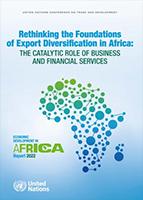
Economic Development in Africa Report 2023 now available
Africa is among the least diversified regions in the world with regard to exports. Commodities account for more than 60 per cent of total merchandise exports in 45 of the 54 countries in Africa, leaving them highly vulnerable to global commodity price shocks and undermining the continent’s inclusive growth and development prospects.
Economic Development in Africa Report 2022 shows that neglecting the potentially transformative role of high knowledge-intensive services, such as information and communications technology services and financial services, is among the key reasons why export diversification remains a challenge in Africa.
The report shows that effectively addressing barriers to services trade under the African Continental Free Trade Area will be key to unleashing the transformative role of services in enhancing the diversity and complexity of products from Africa.
UNCTAD recommends that for export diversification strategies to be impactful in Africa, policies need to be in place that enhance inclusive access to innovative financing technologies, including for small and medium-sized enterprises. Leveraging high knowledge-intensive services to increase productivity and improve competitiveness in the private sector will be key to achieving higher value-added diversification and growth under the African Continental Free Trade Area.
“Economic Development in Africa Report 2022 serves Africa’s effective integration into high-end global value chains, a key objective for its long-term sustainable development.
The African Continental Free Trade Area, which this report analyses in depth, can help foster the growth of a highly competitive, technology-intensive services sector in Africa and thereby drive export diversification.
In addition, our report shows how, by addressing barriers to trade in services, boosting relevant skills and improving access to innovative alternative financing, the region’s manufacturing productivity can be enhanced, driving Africa’s economic growth and structural transformation for many years to come.”
Ms. Rebeca Grynspan
Secretary-General of UNCTAD
“As African countries work to rebuild their economies post COVID-19, Economic Development in Africa Report 2022 brings a new perspective on how the services sector contributes to export diversification and promotes structural change.
The report shows how efficient, cost-effective supply of services, including financial services, can be decisive in the overall diversification process that African countries should prioritize to promote productivity, export growth and sustainable development, and increase greater resilience against future shocks.
The implementation of the African Continental Free Trade Area Agreement is key to unlocking new opportunities for industrialization and export development.”
Mr. Benedict O. Oramah
President and Chair, Board of Directors,
African Export–Import Bank
The Peer Review Process:
A virtual meeting was held on 8 March 2022 to conduct a peer review of the report. It brought together specialists in the fields of commodity trade, export diversification, enterprise development, financial services and trade in services.
The participants were:
- Ahmad Hassan Ahmad (Loughborough University, United Kingdom)
- Christine Awiti (Commonwealth Secretariat)
- Martin Cameron (Trade Research Advisory, South Africa)
- Augustin Fosu (University of Ghana)
- Abbi Kedir (University of Sheffield, United Kingdom)
- Themba Khumalo (African Continental Free Trade Area Secretariat)
- Andrew Mold (Economic Commission for Africa)
- Joy Waruguru Ndubai (Vienna University of Economics and Business Global Tax Policy Centre)
- Boopen Seetanah (University of Mauritius)
- Julia Seiermann (International Trade Centre)
- Komi Tsowou (United Nations Development Programme)
- Wilma Viviers (North-West University, South Africa)


